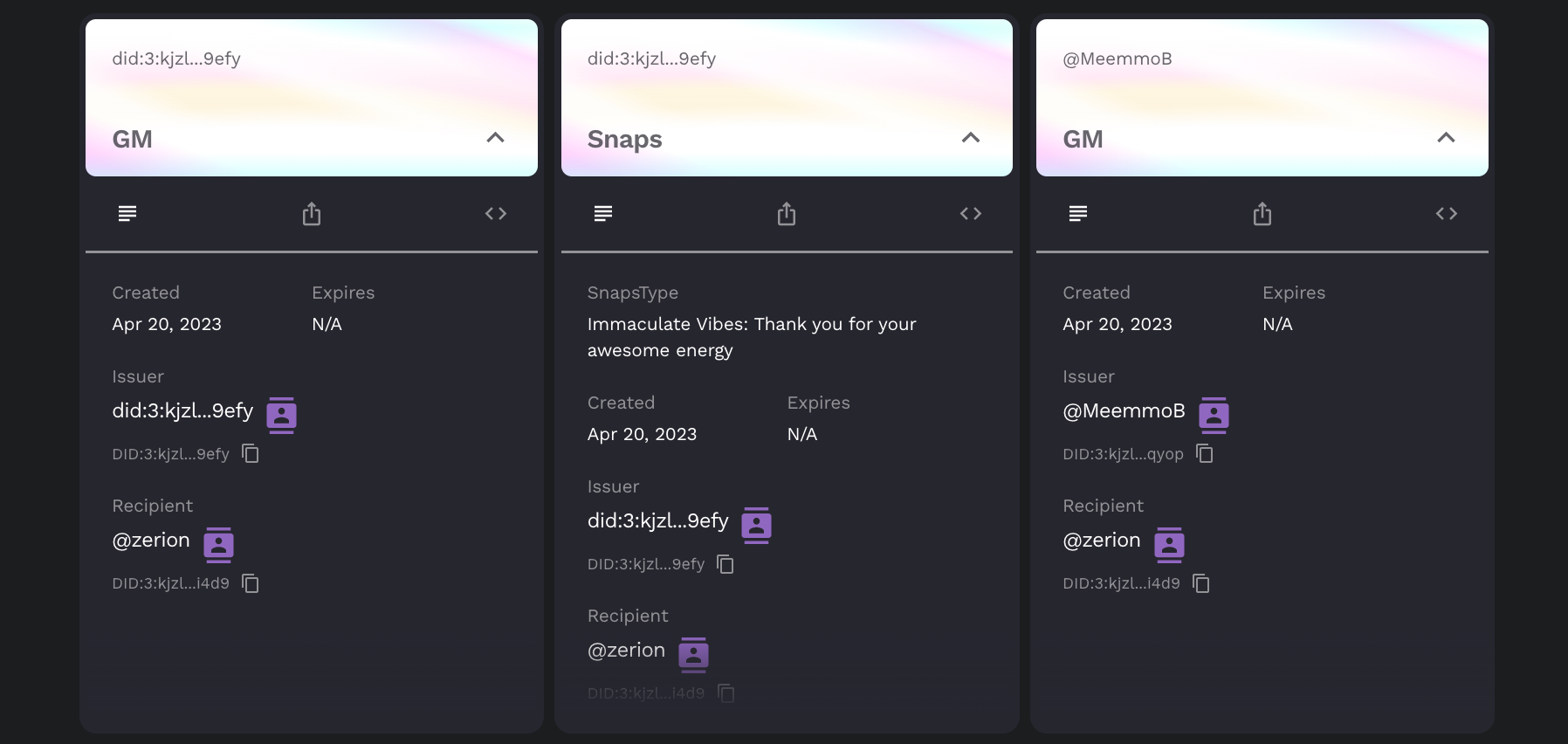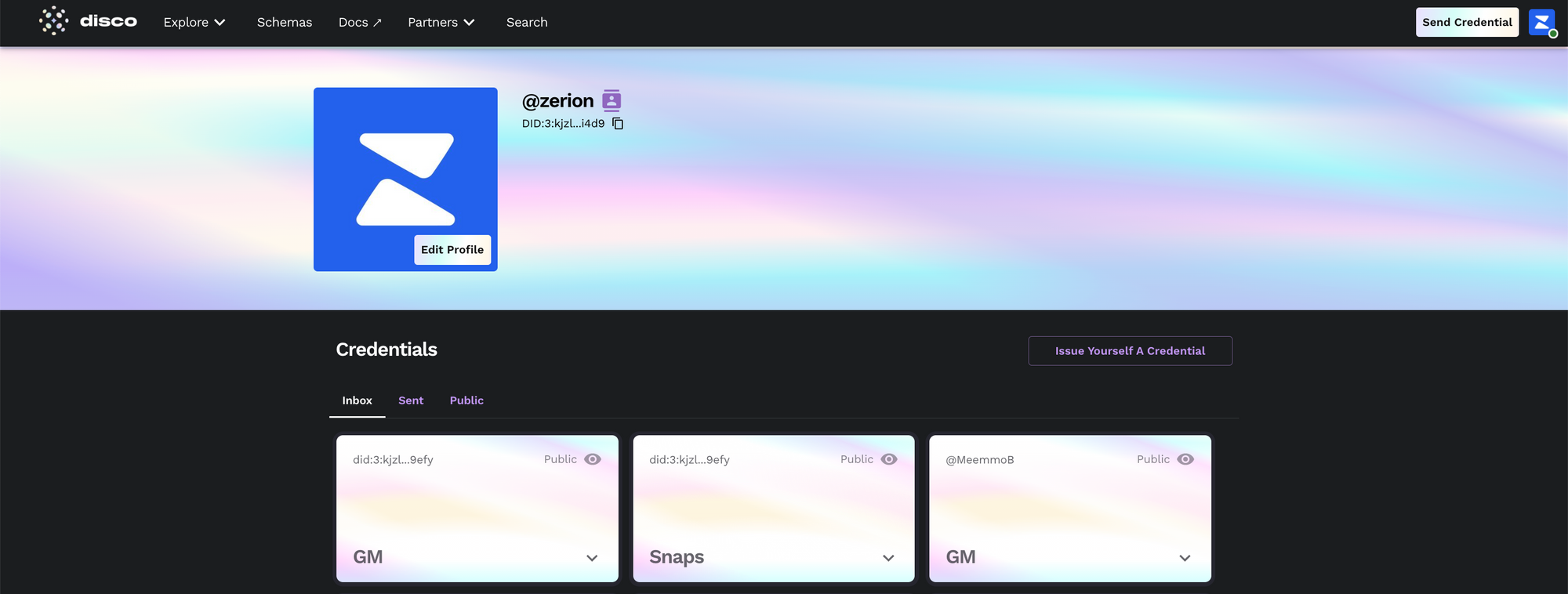Web3 is about decentralization. One of the most critical and least understood parts is decentralized identity.
In this post, we’ll explore decentralized identity and how it works in practice at Disco.xyz with its “data backpack” approach. We'll also show you how to get started with Disco and share some alpha about claiming your first verified credential from Zerion.
What is decentralized identity?
First, let’s start with what an identity is.
Identity is a distinct entity. This could be a physical person, a company, or even something unincorporated like a DAO.
Meanwhile, an identifier is something that points to an identity. For an individual, this could be a government name or an email address. For a company, this could be a registration number or a legal address. The same identity can have many identifiers (for example, you can have several emails).
So decentralized identity usually refers to the idea that you can express your identity using decentralized identifiers.
Centralized vs decentralized identifiers
It’s easier to start with what you already know: centralized identifiers.
We all know how to login with Facebook, Google, Twitter, etc. These are your centralized identifiers. Even if you create a separate login with a password for each service, these new identifiers are still centrally created and stored in databases.
In contrast, decentralized identifiers (DID) are created and owned by you.
The easiest (although imperfect) example of a DID is your Ethereum address. It is generated from your seed phrase and is controlled by your private key. When you sign a message with your wallet, you effectively prove your identity.
While there are many different approaches to DIDs, they all seek to achieve some common important properties:
-
Decentralized: nobody should be able to control the issuance of the identifier;
-
Verifiable: anyone should be able to verify the identifier cryptographically;
-
Persistent: the identifier should not change, and its existence should not depend on any single party;
-
Resolvable: it should point to information that helps you learn about the identity.
In practice, decentralized identifiers are data and the way to use it. DID by itself isn’t particularly useful. To do something with a DID, you usually need a verifiable credential.

Let’s look at an example from the old physical world of atoms.
You, the individual human being, have an identity. Your government name and citizenship are identifiers. Then your passport is the verifiable credential, which is the government’s statement, proving your name and citizenship. It’s verifiable because it can be checked against some government databases.
The decentralized digital world is more abstract.
Your public Ethereum address is your identifier. And your cryptographic signature issued to a dapp is the verifiable credential. It’s verifiable because this specific signature can only be created with your private key.
The problem is that this signature only proves that someone controls that private key (it could well be a bot) and is limited to only onchain data.
That’s where decentralized identity solutions like Disco come to shine.
What is Disco xyz
Disco.xyz helps you manage your identifiers and issue verifiable credentials.
Think of your Disco account as your “data backpack” with all your identifiers. You can connect your Ethereum address, your Twitter, Discord, and more.
After that, you can issue verifiable credentials (VCs) to other users. You can also receive VCs from others. Currently, these VCs are limited to sending GMs and “vouches”, proving connections and good vibes.

In future, VCs could be used to prove various things. For example, a DAO can issue a VC to prove you are a member. A credential from a university can act as a diploma. You can issue your own credential to someone you work with to prove their skills.
This might sound like NFTs, but verified credentials are different.
Unlike NFTs, VCs in Disco are private by default. Only you and the recipient can see the credential. The recipient, however, can choose to make the credential public.
Also issuing or managing VCs doesn't cost any gas. In fact, Disco is blockchain agnostic and in can potentially work with many different networks.
It’s easier to see how this works in practice by creating your own Disco data backpack.
Create your Disco data backpack
Although Disco is still in beta, anyone can try it now.

-
Connect your wallet to https://app.disco.xyz/ (you can the link in the Dapp Browser in Zerion Wallet) and create your Data Backpack. This will create a new account with Ceramic, the decentralized data network.
-
Click “Create new account” and sign two messages. Don’t switch tabs because the message might get dismissed. Also, be patient, this can take some time.
-
Add your off-chain accounts: Disco currently supports Twitter, Discord, and traditional domain names (.com, .xyz, etc). Adding these identifiers will help others to find and verify you. If you want, you can later always remove these accounts.
-
If you hold an active Zerion DNA, you will automatically get Zerion Proof of Mint, your first Verified Credential from Zerion! You’ll find it in your Disco's Inbox. Like any other VC, it is private by default — make it public by clicking the eye icon.
-
Fill out your profile. This is not mandatory but will let you claim the Official Disconaut verified credential.
-
If you got the Official Disconaut credential (make sure it’s public by clicking the eye icon), you can join Guild to unlock Disco’s Discord channels.
-
Once you have your Discounaut VC, you can also mint a Disco District NFT (also available on Optimism if you don't want to avoid high gas fees).
What's next
Disco is one of the most exciting projects in the decentralized identity space.
Disco have a solid team and are building a tight-knit community of active Web3 citizens. As always, by being early, you maximize your chances of reaping any potential rewards later. Finally, you can expect Disco integrations in the Zerion Wallet. Stay tuned!
FAQ
How can I check if I’m eligible for the Zerion Proof of Mint?
If you have already been issued a Zerion VC, it will show up in the Perks section of your Zerion Wallet.
Will I get the Zerion credential if I buy or mint a Zerion DNA now?
The initial Zerion verified credential (VC) is available to those who held a Zerion DNA before 17 May. Newer holders will be periodically get verified credentials in batches — it will show up in the Perks section of your wallet. Eventually, this should be automated but there is no ETA for now.
Is Zerion Proof of Mint an NFT and if so, on which network does it use?
Zerion Proof of Mint is not an NFT, it’s a verifiable credential (VC) in Disco. It’s not tradeable or moveable, but it could be useful for future verification via Disco. For example, it could help you get other credentials or unlock new opportunities (unique merch, exclusive Discord channels, etc).